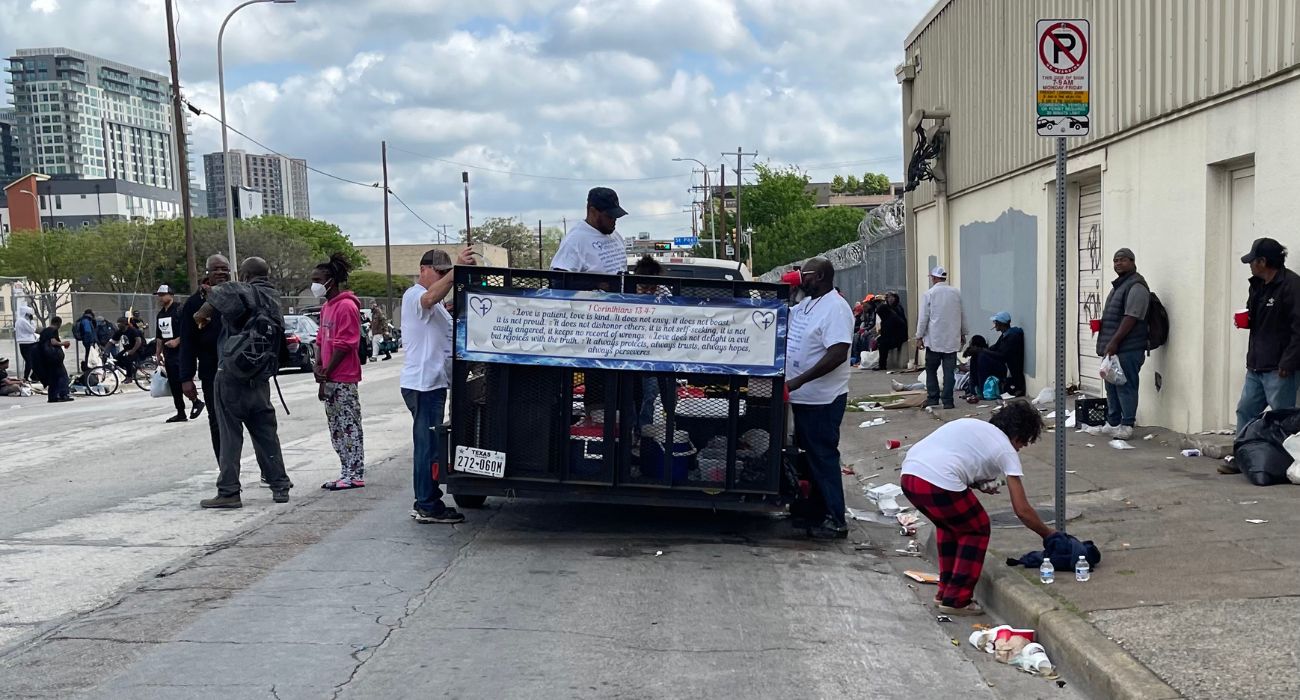
One group of distributors gave food from a steel mesh utility trailer that had a banner with 1 Corinthians 13:4-7 hung from its gate. The other distributor had no clear religious or secular branding. The homeless people and vagrants formed a line on the righthand side of the street so they could go from one distributor to the next uninterrupted.
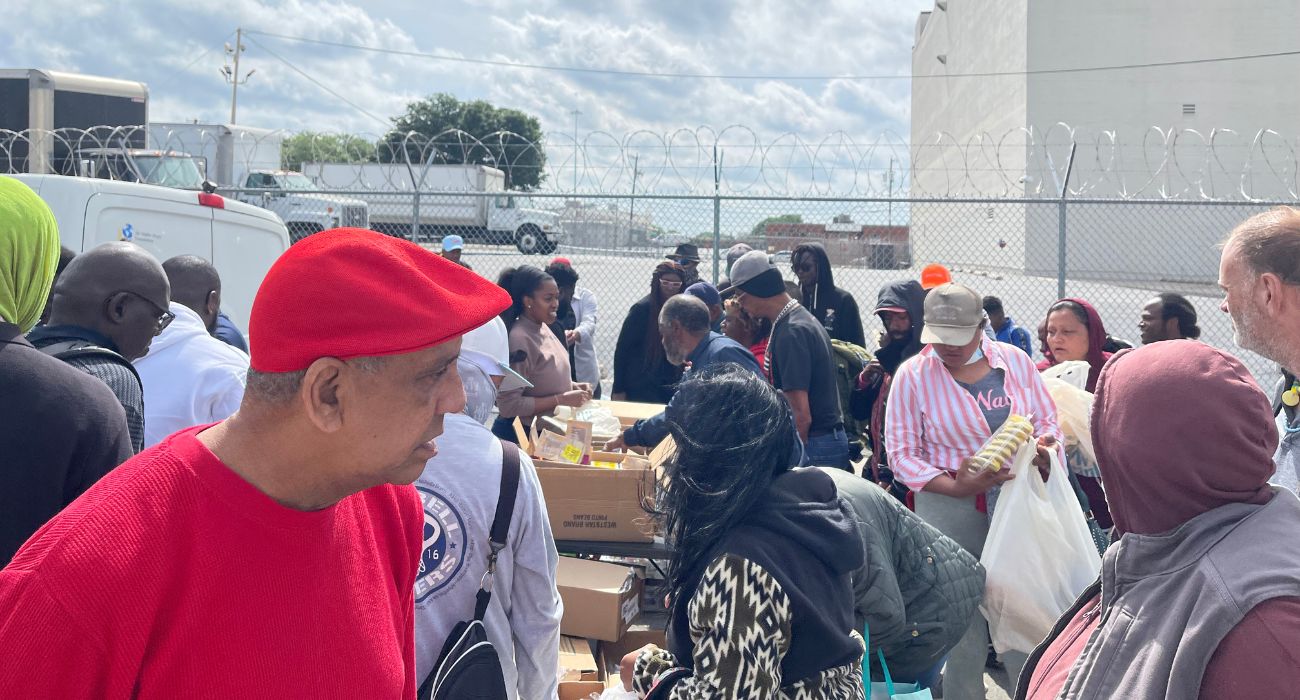
Echoing the Great Depression, bread was the ration of the day. The distributors in the trailer gave out loaves of white, wheat, and sourdough bread, as well as prepackaged rolls and cookies. The other distributors gave snack bars, Mountain Dew, Dr. Pepper, and some produce, including cucumbers, bananas, oranges, and bell peppers.
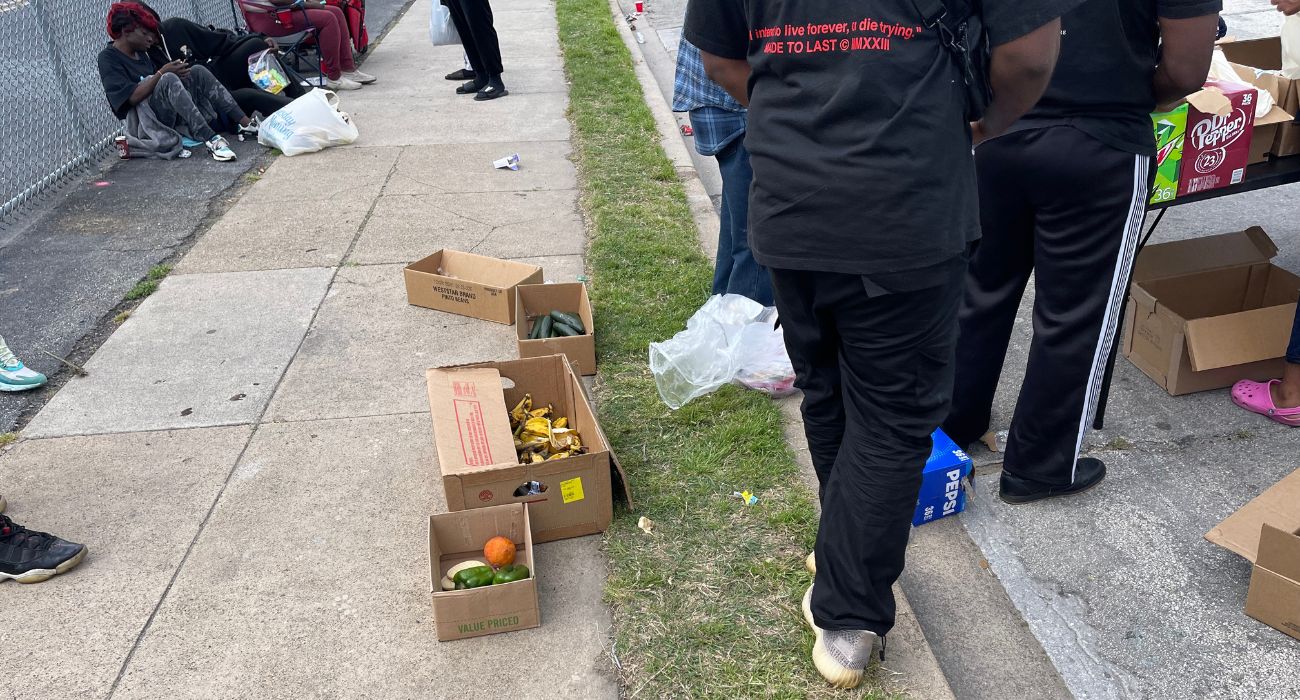
There was a small governmental presence this Saturday. When DX previously covered the feedings on Cadiz Street, there were no trashcans nearby and a nearly non-existent presence of City services despite being located just feet from City Hall. This time, there were two City homeless outreach officers in purple shirts and a security guard at the intersection of Cadiz and Ervay for the duration of the distribution.
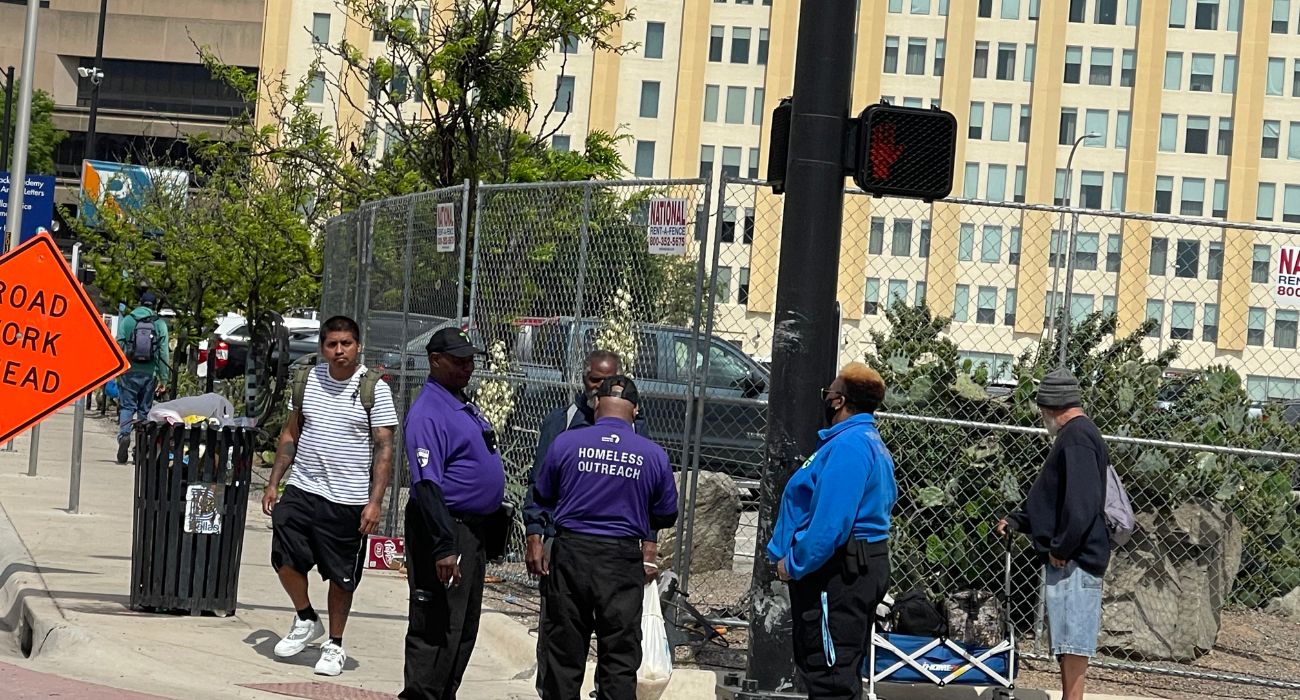
The outreach officers engaged scores of homeless. At times, officials were seen engaging with as many as four homeless individuals simultaneously. Meanwhile, the several trashcans placed in the area overflowed and spilled on the street. DX saw several latecomers pick through the trash for food and scraps of packaging material.
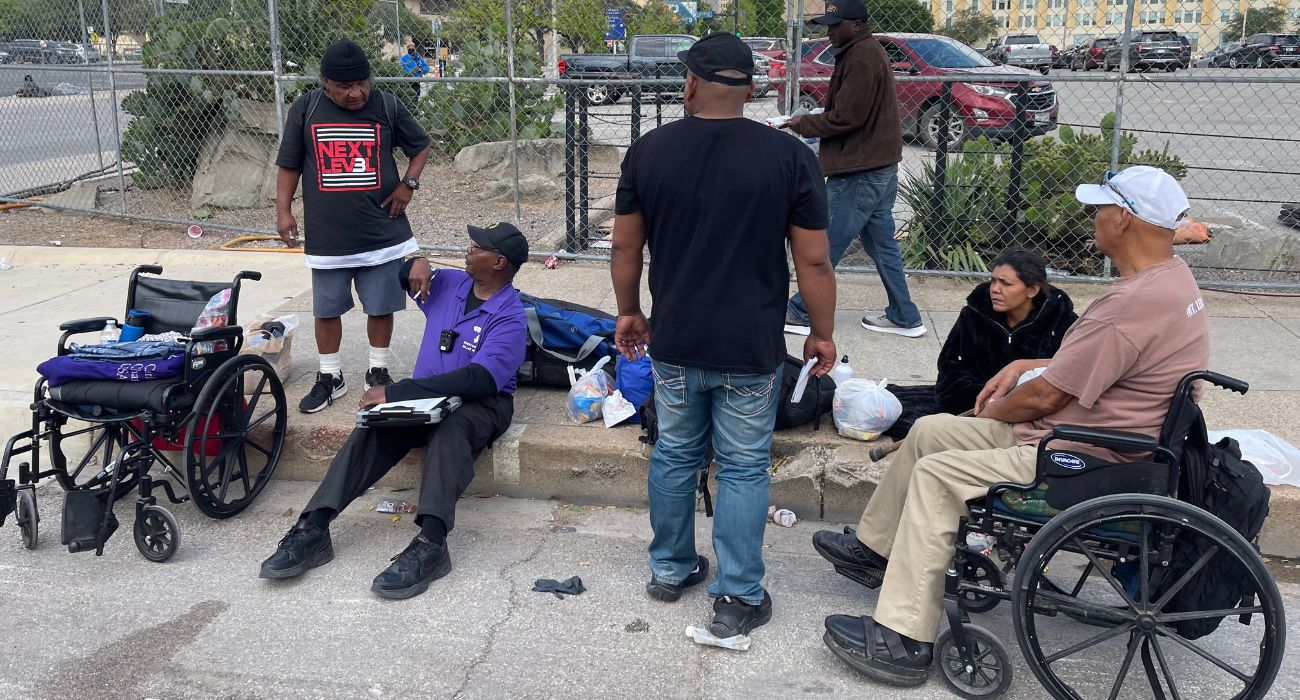
The small tent city that formed near the intersection of Cadiz and St. Paul had grown. There were more than a dozen tents and makeshift structures placed on both sides of that segment of the street. Several dogs were observed, some leashed and some loose, in the tent city.
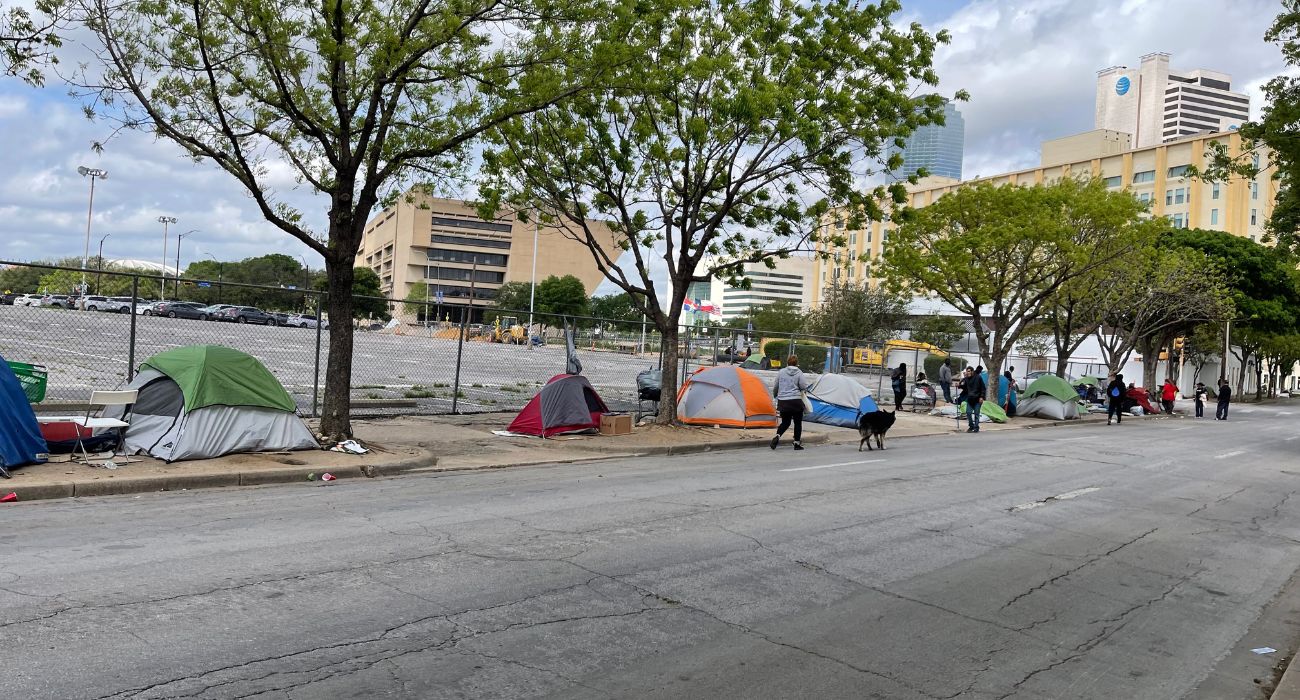
Trash on this block appeared to be from previous feedings, as it did not resemble the food given by Saturday’s distributors. The lone trashcan on the block, a rusting oil drum, was also overflowing. At times, the wind carried trash out of the receptacles and onto the road.
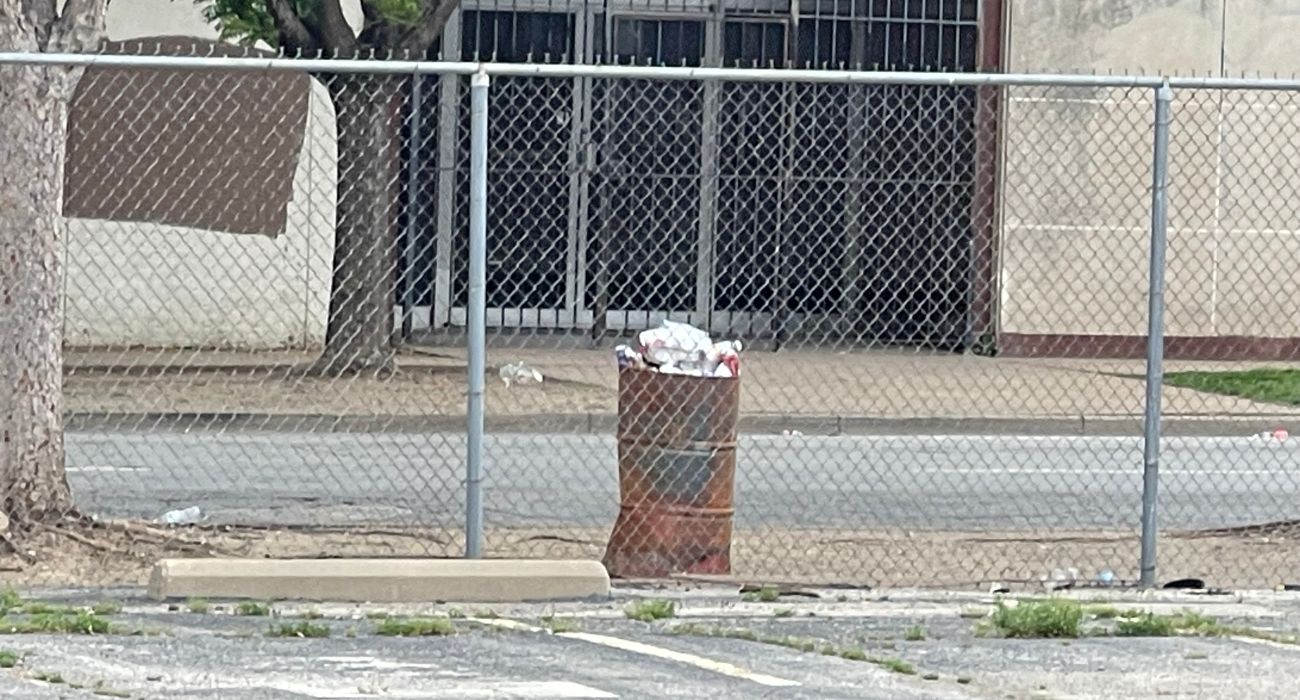
Although the garbage did not delay traffic, humans repeatedly did as cars repeatedly stopped or stalled to avoid hitting the homeless as they went about the area.
DX observed what was likely to be human excrement on the streets of the rudimentary village. There were numerous bottles of urine in the gutter on St. Paul Street. Bottles with like contents were seen on other neighboring blocks. Other trash included fast food boxes, scattered nails, and plastic wrap.
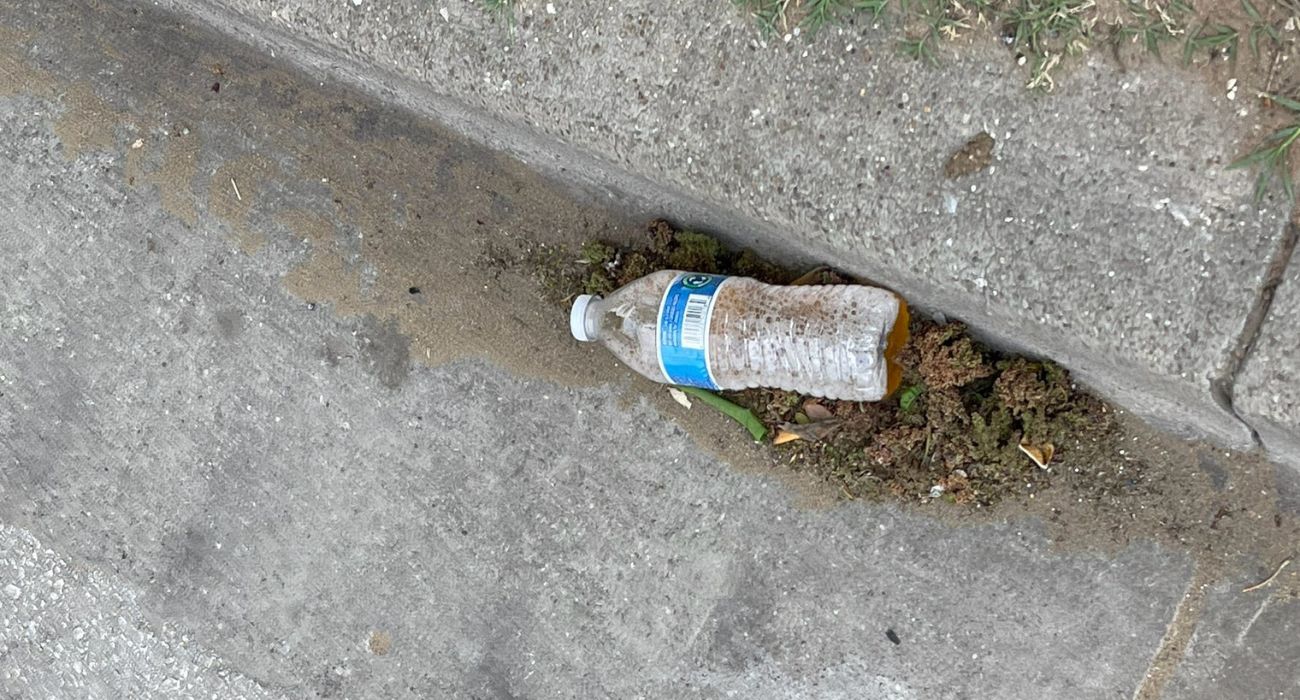
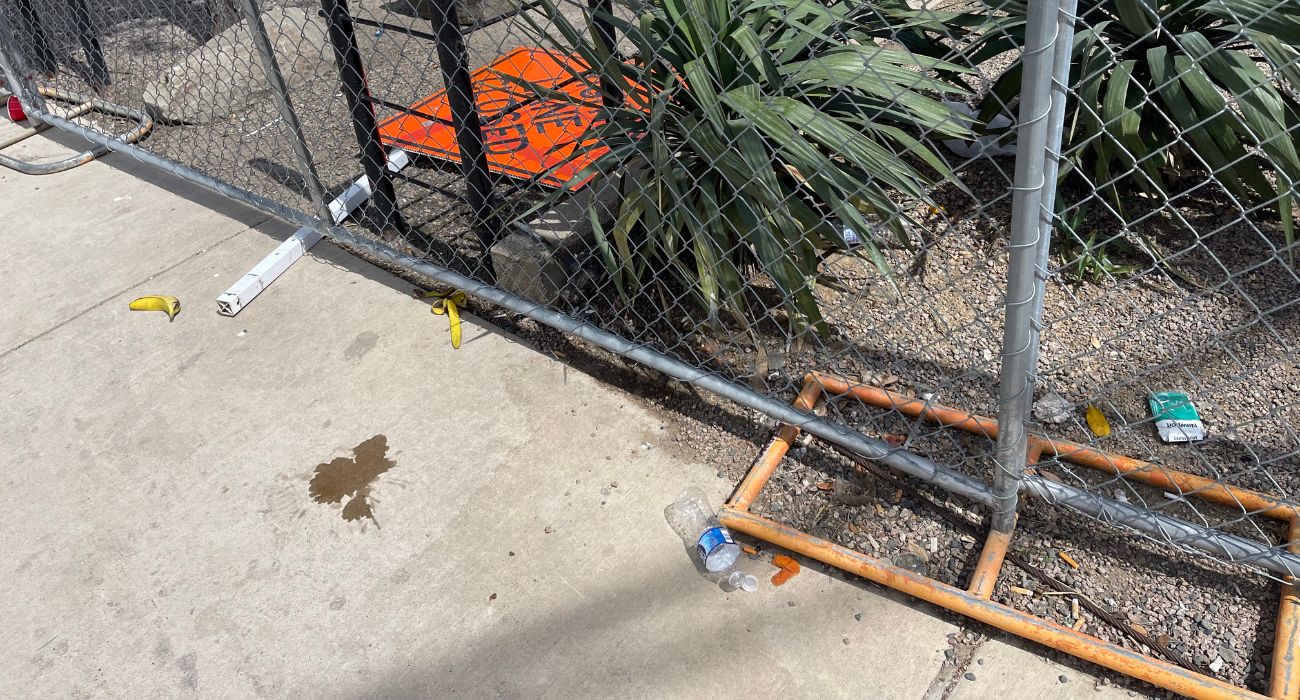
Many of the homeless lay in filth as they consumed what had been given to them. One man reclined on a scrap of cardboard next to the bread line as he ate. He was surrounded by crushed trash and unidentifiable debris.
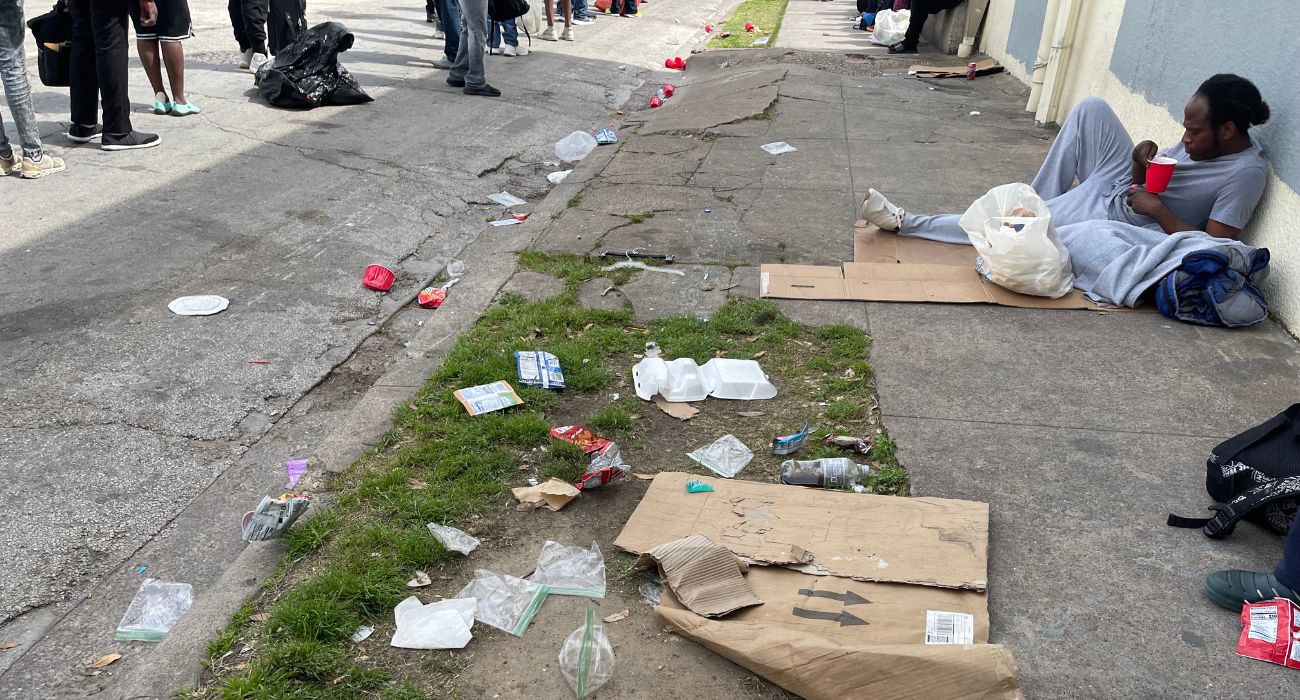
Despite the metaphorical darkness of what was a sunny day, Christians vigorously engaged the homeless. The Church Bus was present again. However, it moved one block down from its usual spot so its flock could take refuge from the heat in the shade of the Dallas All Saints building.
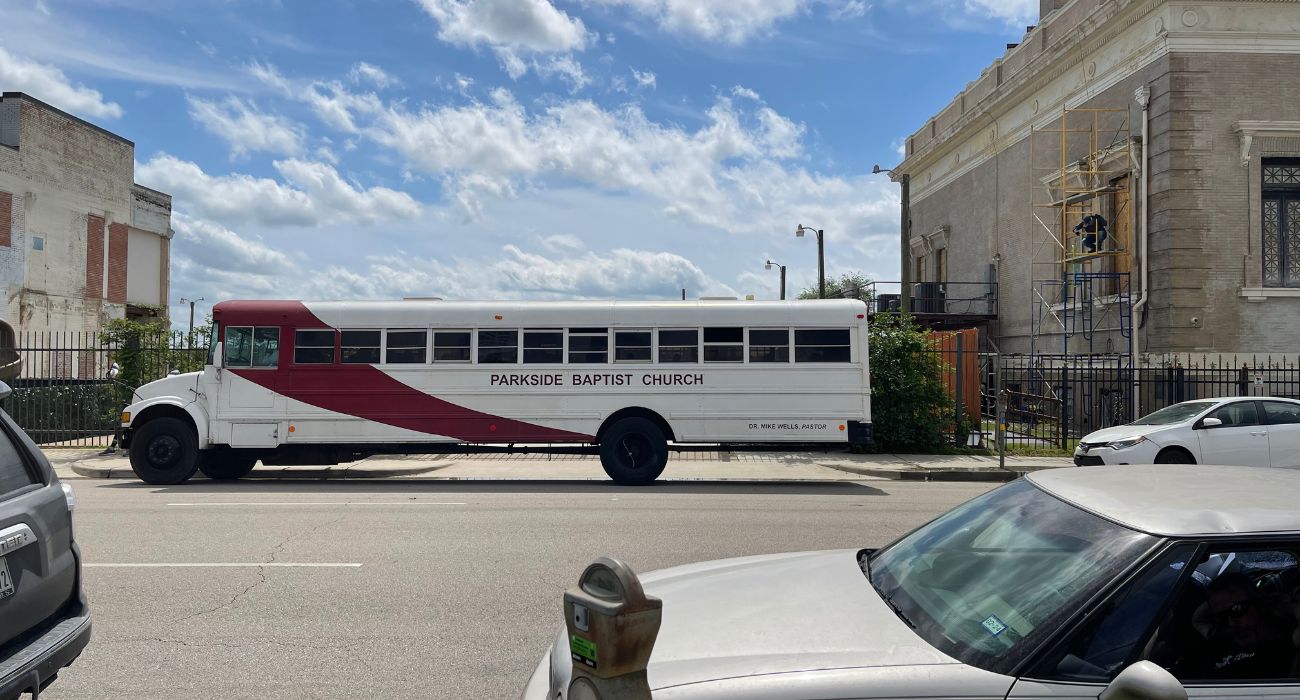
The Parkside Baptists who operate the converted automobile have been on a streak of successful conversions. Preacher Howard Moran of Omaha, Nebraska, who had come down to assist with religious services this weekend, reached people at the men’s section of Union Gospel Mission the night before. Moran had discovered Jesus while fighting in Vietnam and he told DX, “I don’t want people to die without finding him.”
People profess a belief in Christ here every week, multiple Parkside congregants told DX. A baptism at Parkside’s church in Mesquite for the homeless congregation is scheduled for April 27. Soon, they hope to get access to the women’s and children’s sections of the mission, so they can continue spreading the Gospel.
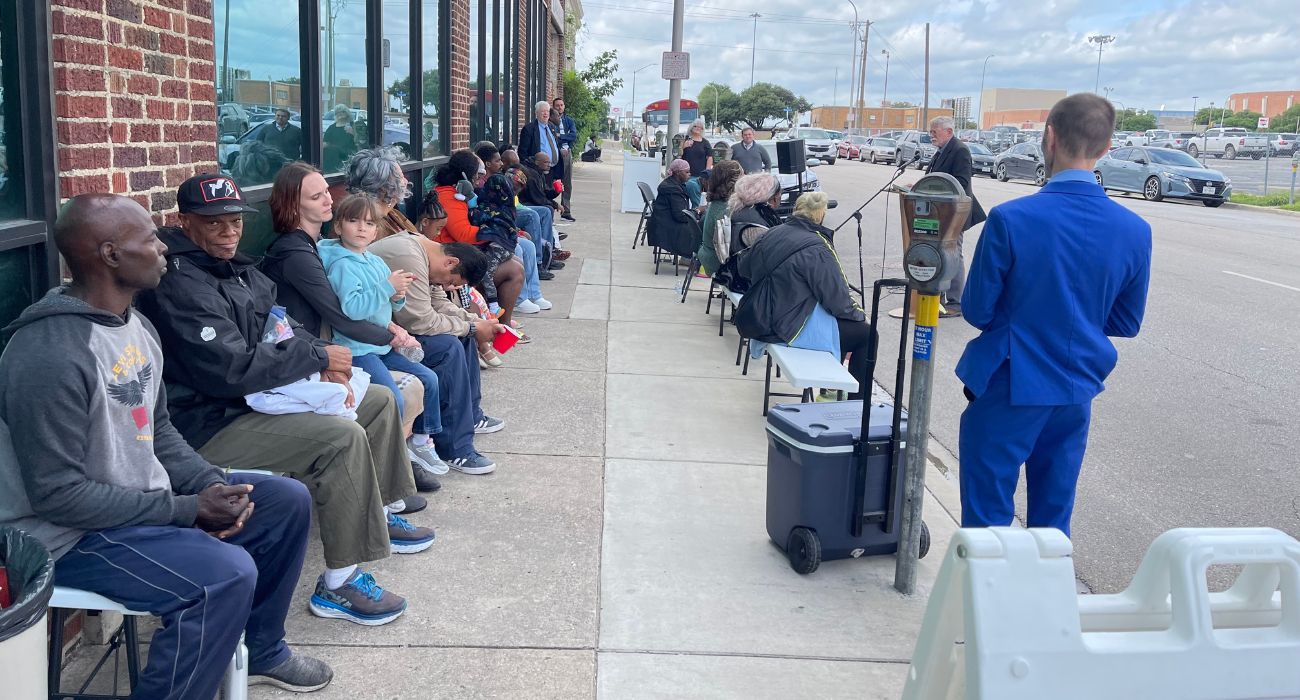
Moran (pictured far back left, blue shirt) and others worked the line as the homeless took their daily break, hoping to help the needy seek forgiveness of trespasses and deliverance from evil. They spoke of redemption and the path to Christ. They invited countless individuals to worship. These men spoke to whoever would speak to them and for however long they wanted to talk.
Parkside’s portable pews were full, as they always are, during the services. Staff told DX there are “three or four regulars” whom they see every week. However, most of the congregation is new or comes intermittently. On this day, the congregation heard the story of the resurrection and three women sang the hymn “My God Is Real.”
By 11:30 a.m., food distribution had come to an end. Those who remained either sought out the church and the government workers or gathered around each other to socialize. Some boarded a DART bus, which stopped nearby, and went to unknown locations. Others took off on foot down the many adjacent side streets.
Leaders at The Bridge, a nearby non-profit homeless intervention center, have repeatedly objected to the practice of street feeding. While a spokesperson acknowledged to DX that food distributors’ “hearts [are] in the right place,” they argued that street feeding exacerbates the homelessness issue.
“While most think this is helping those living on the streets of Dallas, it is not. It worsens the problem because they know they will be able to get food from ‘street feeders’ and not seek services from homeless response and services agencies like The Bridge. Have you heard the quote, ‘Give a man a fish and he will eat for a day, but teach a man to fish and he will eat for a lifetime?’ It is the same principle,” the spokesperson previously told DX.
Free, hot meals draw many homeless to The Bridge, where some 5,000 individuals were served just last year.
“When they are forced [by hunger] to come in for a meal, our highly trained staff try to engage them, where they are, and build trust with them and encourage them to seek services. Homeless recovery is possible, and it is happening at The Bridge, however, the process can be long and filled with complexities and setbacks,” the spokesperson said before extending an invitation to those who want to help to volunteer or donate to the organization or similar institutions, like The Stewpot, Austin Street, and domestic violence shelters.
Services available at The Bridge include medical and psychological resources, housing, detox, and workforce training. Homeless “Guests,” with a capital G, as The Bridge calls them, can even bring their dogs into the shelter for housing and medical care.
David Woody III, president and CEO of The Bridge, identified street feeding as denying “entry to a sustainable homeless solution.” He echoed earlier statements from his staff by noting it “affirms a notion that someone is going to solve your problems for you.” Notably, The Bridge boasts a roughly 95% success rate when it comes to former Guests continuing to be housed at six months, the organization told DX.
“Street feeding feeds tummies, not minds,” Woody added.
Some 75% of voters say homelessness, vagrancy, and panhandling continue to be “major” problems in Dallas, and DX polling indicates most residents support the “one-stop-shop” model where transitional housing is maintained at the same location where critical services are provided.
Surveyed Dallas residents have also registered their displeasure with the perceived uncleanliness of the city, as previously reported by DX.


